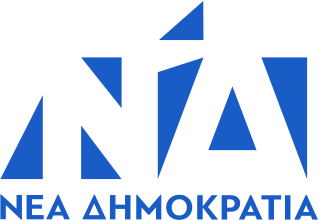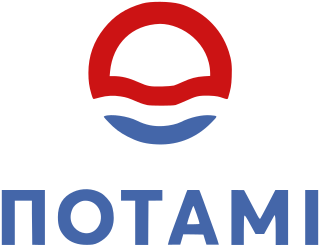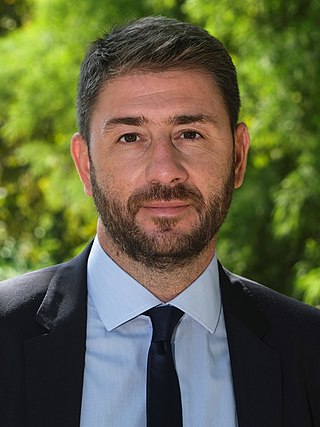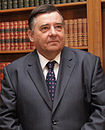
The Democratic Social Movement is a social-democratic political party in Greece. The party was founded in 1995 by Dimitris Tsovolas and several ex-members of the Panhellenic Socialist Movement (PASOK), the then ruling social-democratic party.

The Panhellenic Socialist Movement, known mostly by its acronym PASOK, is a social-democratic political party in Greece. Until 2012 it was one of the two major parties in the country, along with New Democracy, its main political rival. After a decade of poor electoral outcomes, PASOK has retained its position as one of the main Greek political parties and is currently the second largest party in the Greek Parliament.

Parliamentary elections were held in Greece on 7 March 2004. The New Democracy Party of Kostas Karamanlis won the elections, ending eleven years of rule by PASOK. PASOK was led into the elections by George Papandreou, who succeeded retiring Prime Minister Costas Simitis as party leader in February.

New Democracy is a liberal-conservative political party in Greece. In contemporary Greek politics, New Democracy has been the main centre-right to right wing political party and one of the two major parties along with its historic rival, the Panhellenic Socialist Movement (PASOK). New Democracy and PASOK were created in the wake of the toppling of the military junta in 1974, ruling Greece in succession for the next four decades. Following the electoral decline of PASOK, New Democracy remained one of the two major parties in Greece, the other being the Coalition of the Radical Left (SYRIZA). The party was founded in 1974 by Konstantinos Karamanlis and in the same year it formed the first cabinet of the Third Hellenic Republic. New Democracy is a member of the European People's Party, the largest European political party since 1999, the Centrist Democrat International, and the International Democracy Union.

Antonis Samaras is a Greek politician who served as 14th Prime Minister of Greece from 2012 to 2015. Member of the New Democracy party, he was its president from 2009 until 2015. Samaras started his national political career as Minister of Finance in 1989; he served as Minister of Foreign Affairs from 1989 to 1992 and Minister of Culture in 2009.

The Coalition of the Radical Left – Progressive Alliance, best known by the syllabic abbreviation SYRIZA, is a centre-left to left-wing political party in Greece. It was founded in 2004 as a political coalition of left-wing and radical left parties, and registered as a political party in 2012.
In early 2006, Prime Minister Kostas Karamanlis of the New Democracy party proposed an amendment to the Greek Constitution of 1975/1986/2001 with 38 new provisions. Of these, 3 were adopted in May 2008:
A leadership election was held on November 11, 2007 in the Panhellenic Socialist Movement (PASOK), Greece's main centre-left party, after it was defeated in the parliamentary election earlier that year. The incumbent, George Papandreou, had stated right after the general elections that he would ask party members to renew their confidence in him, while Evangelos Venizelos and Kostas Skandalidis also declared themselves candidates.

Early parliamentary elections were held in Greece on 4 October 2009. Elections were not required until September 2011, but on 2 September 2009 Prime Minister Kostas Karamanlis of New Democracy announced that he would request President Karolos Papoulias dissolve Parliament and call elections. Parliament was dissolved on 9 September.

The 2009 New Democracy leadership election was held on 29 November 2009, following the official announcement of the resignation of Kostas Karamanlis, after more than 12 years as leader of New Democracy, the main centre-right political party and one of the two major parties in Greece.

Parliamentary elections were held in Greece on Sunday, 6 May 2012 to elect all 300 members to the Hellenic Parliament. It was scheduled to be held in late 2013, four years after the previous election; however, an early election was stipulated in the coalition agreement of November 2011 which formed the Papademos Cabinet. The coalition comprised both of Greece's traditional major political parties, PASOK on the left and New Democracy (ND) on the right, as well as the right-wing Popular Orthodox Rally (LAOS). The aim of the coalition was to relieve the Greek government-debt crisis by ratifying and implementing decisions taken with other Eurozone countries and the International Monetary Fund (IMF) a month earlier.

Parliamentary elections were held in Greece on Sunday, 17 June 2012, to elect all 300 members to the Hellenic Parliament in accordance with the constitution, after all attempts to form a new government failed following the May elections. If all attempts to form a new government fail, the constitution directs the president to dissolve a newly elected parliament, and then to call for new parliamentary elections within 30 days of the dissolution. The president announced at 16 May the date for the new election, and signed the formal decree to dissolve the parliament and call for the election at 19 May.

Thessaloniki Alpha is an electoral constituency of the Hellenic Parliament. With an electorate of 531,732 eligible voters (as of 2019) in the urban area of Thessaloniki, Central Macedonia, it elects sixteen members of parliament.

The River was a centrist and social-liberal political party in Greece. The party was founded in February 2014 by Stavros Theodorakis. The party did not run in the 2019 elections and had no seats in the Hellenic Parliament.

Indirect presidential elections were held in Greece in December 2014 and February 2015 for the succession to Karolos Papoulias as President of the Hellenic Republic. The candidate of the ND–PASOK government, Stavros Dimas, failed to secure the required majority of MPs of the Hellenic Parliament in the first three rounds of voting in December. According to the provisions of the Constitution of Greece, a snap election was held on 25 January 2015, which was won by the left-wing Syriza party. Following the convening of the new Parliament, the presidential election resumed. On 18 February 2015, veteran ND politician Prokopis Pavlopoulos, backed by the Syriza-ANEL coalition government, was elected with 233 votes.

Nikos Androulakis is a Greek politician who serves as president of the PASOK – Movement for Change since 2021. He served also as Member of the European Parliament from 2014 to 2023.

The PASOK – Movement for Change is a political alliance in Greece, which was founded in March 2018, initially as "Movement for Change", mainly affiliated with the centre-left of the political spectrum. It includes the Panhellenic Socialist Movement (PASOK) and Movement of Democratic Socialists (KIDISO).
Achaea is a constituency of the Hellenic Parliament. It corresponds to Achaea Prefecture and elects eight members of parliament. The members of the prominent Papandreou politician family come from this constituency.
Socialism in Greece has a significant history, with various activists, politicians and political parties identifying as socialist. Socialist movements in Greece began to form around the early 20th century, including the Communist Party of Greece (KKE) (1920–present), the Socialist Party of Greece (1920-1953) and the Panhellenic Socialist Movement (PASOK). Socialist ideology is present in ΚΚΕ also known as the Communist party of Greece.





















